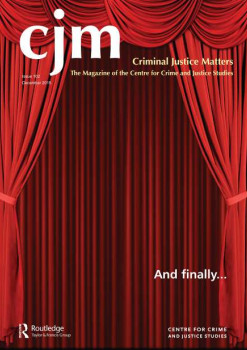After 26 years of continuous publication, we are paused the production of cjm at the end of 2015.
In this, the final issue in its current format, we have given over the pages to showcase some of our favourite articles from among the several hundred to have graced this magazine. The articles we have chosen cover a range of topics that have become prevailing areas of concern for the Centre in recent years. There are articles on the relationship between research evidence and policy-making; on political economy, social policy and social harm; on violence and criminalisation.
They should not be read as an indisputable ‘greatest hits’ collection. They are simply the articles that stood out when we made the selection, both in the topics they cover and in their style of exposition. Others, using a different yardstick, would no doubt have made different choices.
In this edition
Over 26 years, cjm has been at the forefront of informed and accessible critique
By Richard Garside
Criminologists should challenge the tendency for research carried out under the aegis of the Home Office to serve the purposes of the current government
By Reece Walters
The evidence in evidence-based policy making is not all it's cracked up to be
By Tim Hope
The government has shown a lack of will to engage with the systemic failures highlighted by tragic deaths in custodial settings
By Deborah Coles and Helen Shaw
John M Moore sets detention in an historical context and questions its 'reformative' goals.
By John M Moore
John Muncie argues that a critical understanding of criminalisation remains crucial
By John Muncie
Robert Chernomas and Ian Hudson argue that conservative economics have led to a more dangerous society
By Robert Chernomas and Ian Hudson
Julia Sudbury examines how grassroots campaigning is set to transform criminal justice in the US
By Julia Sudbury
Paul Crawshaw, Alex Scott-Samuel, and Debbi Stanistreet discuss masculinity and harm
By Paul Crawshaw, Alex Scott-Samuel, and Debbi Stanistreet
John Lea and Simon Hallsworth put the riots into political and historic perspective
By John Lea and Simon Hallsworth
Barry Goldson asserts that history has taught us that diversion is more effective than intervention
By Barry Goldson
New Labour's focus on anti-social behaviour lacks a proper evidence based and has led to the persecution of those with mental health problems argues David Gregg
By David Gregg
Joe Sim argues that New Labour stannds indicted for intensifying politically and spiritually corrosive policies in the criminal justice system
By Joe Sim
Tim Bateman highlights the case for and resistance against raising the age in England and Wales
By Tim Bateman
Sarah Lamble explores why market logic curtails possibilities for genuine alternatives
By Sarah Lamble
Paddy Hillyard says we should stop looking at crime and start looking at social harm
By Paddy Hillyard
David Whyte looks at what surfaced from the murky depths of the police, and the financial and political worlds in 2012
By David Whyte
Steve Tombs discusses the latest chapter in a long history of financial services fraud
By Steve Tombs
Auke Williams argues that the lack of psychiatric treatment adds a penal dimension to Belgium's euthanasia system
By Auke Williams
As part of our Justice Matters initiative we are challenging people to think about a criminal justice practice, policy or institution to abolish or abstain from, here contributors…
By Tim Hope, Chris Stanley, Tracey McMahon, Ben Bowling, J M Moore, Jordan Beaumont
Scott Poynting details the British state's involvement in kidnapping and torture
By Scott Poynting
Julie T Davies examines the state's role in limiting 'the truth'
By Julie T Davis
Andrew Henley argues that those who have been punished should be free from future discrimination
By Andrew Henley
Nina Vaswani describes some of the findings from her research
By Nina Vaswani
